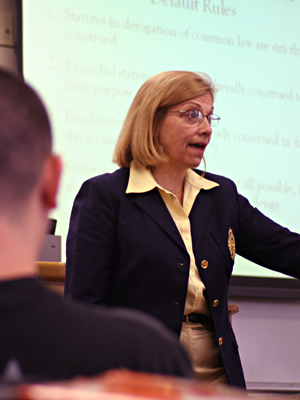Law school is a whole different world.
From the minute first-year students enter the hallways at Bowen, they learn what it means to be a lawyer. They begin to treat legal institutions with a new respect, and Reasoning, Writing, and Advocacy (RWA) classes provide the first hint at what judges and fellow attorneys will expect when these students enter the working world.
 “Professionalism is a part of the grade in RWA classes,” said Professor Coleen Barger, who is one of a team of professors who teach this first-year, two-semester course. “They must be ethical, prepared, on-time, respectful, and civil. We expect them to be the kind of lawyer others look up to.”
“Professionalism is a part of the grade in RWA classes,” said Professor Coleen Barger, who is one of a team of professors who teach this first-year, two-semester course. “They must be ethical, prepared, on-time, respectful, and civil. We expect them to be the kind of lawyer others look up to.”
Students have often never encountered the kind of mindset that RWA classes – as well as subsequent courses in professional behavior – demand, according to Professor Terrence Cain.
“We plunge them into the kind of things they will be doing as young lawyers and clerks,” Cain said. “These classes are a way to make their profession real so they’re not surprised by the expectations of others when they begin work.”
RWA also teaches students that their chosen profession is based in service and that the needs of their clients should always come first, Barger said.
 “There’s more to professionalism,” added Professor George Mader. “It’s not merely wearing the right clothes and saying ‘Your Honor.’ It’s a commitment to excellence and competence as well as the knowledge, analysis, and all the other things you do as an attorney to help your client with his or her case.”
“There’s more to professionalism,” added Professor George Mader. “It’s not merely wearing the right clothes and saying ‘Your Honor.’ It’s a commitment to excellence and competence as well as the knowledge, analysis, and all the other things you do as an attorney to help your client with his or her case.”
An attorney’s creativity is frequently the difference maker in the courtroom and the boardroom, Professor Lyn Entrikin said. Regurgitation of laws and procedure won’t help an attorney very much when he can’t figure out how to handle a problem he hasn’t faced before.
 “The bundle of skills we teach includes other things as well. For instance, credibility takes a long time to build and it can be quickly lost,” Entrikin added. “Students coming into our program have no idea how it’s different, but teaching them how being an attorney is different from other professions is a big responsibility for us.
“The bundle of skills we teach includes other things as well. For instance, credibility takes a long time to build and it can be quickly lost,” Entrikin added. “Students coming into our program have no idea how it’s different, but teaching them how being an attorney is different from other professions is a big responsibility for us.
Instilling professionalism in young students has to be pervasive throughout the legal curriculum in order to be effective. The skills of legal reasoning as well as writing skills – things like determining facts of legal significance and tailoring a document to the needs of its audience – are elements that RWA professors emphasize in their classes.
“Students who do the best in RWA classes are those who are prepared to be adult learners of a new skill,” said Professor Lindsey Gustafson. “They can’t necessarily be focused solely on grades. They have to see learning in RWA as a process of continuous improvement instead of a destination.”
 Barger said the group of five professors has big plans for the future of Bowen’s top-ranked legal writing program. Among them are the opportunities to build upper-level writing courses and expand the attention given to legal writing across the curriculum.
Barger said the group of five professors has big plans for the future of Bowen’s top-ranked legal writing program. Among them are the opportunities to build upper-level writing courses and expand the attention given to legal writing across the curriculum.
“We are proud that we’re tenure-track professors and we are involved in the national community of legal writing professionals at the leadership level,” Barger added. “We’d like to be able to dedicate more resources before students get here for their first year so that they’re better prepared for success at Bowen. Providing a strong network of legal writing mentors and giving more resources to our students will help with their success as well.”
